Murder on a Midsummer Night by Kerry Greenwood follows the adventures of the audacious private detective Phryne Fisher in 1929 Melbourne as she tackles two intriguing and complex cases simultaneously. The first case involves the mysterious death of Augustine Manifold, an antique dealer. Though his death appears to be a suicide, Augustine’s mother is convinced otherwise and hires Phryne to investigate. Delving into the antique world, Phryne uncovers a complex web of deceit, smuggling, and family secrets. Her sharp intuition and investigative skills lead her to conclude that Augustine’s death was indeed a cleverly disguised murder.
The second case Phryne takes on is the search for a missing illegitimate child, whose inheritance is at stake. This investigation takes her into the complex world of midwives and adoptions, where she uncovers the desperate measures taken by single mothers to secure better futures for their children. As Phryne follows the trail of clues, she unearths hidden truths about the child’s identity and the extreme lengths to which families will go to protect their secrets, adding to the suspense of the story.
Phryne, with her unique blend of resourcefulness and charm, encounters a vibrant cast of characters in her investigations. From dubious antique dealers to eccentric family members and streetwise informants, she navigates the maze of red herrings and dead ends with ease. Her sharp intuition and investigative skills ultimately lead her to unravel the true circumstances of Augustine Manifold’s death and resolve the inheritance dispute involving the missing child, bringing justice and closure to the affected families.
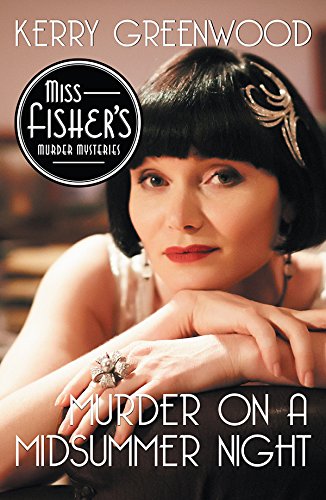
The Review
Murder on a Midsummer Night is probably the weakest mystery in the Phryne Fisher series. Even though I know I’ve read it before, as I studied the cover to begin this re-read, no plot threads or interesting characters came to mind.
The two stories, the young shopkeeper whose mother hires Phryne because she believes he has been murdered and didn’t commit suicide and the finding of an illegitimate child who might come into a family inheritance, fall well within Greenwood’s wheelhouse are ripe for social commentary and profoundly affecting character arcs, as people are forced to keep secrets due to social mores that are out of their control. Yet, the book feels incredibly flat.
All of the characters who make up the young shopkeeper’s life are unlikable and bizarre with their seances and affected nonchalance or maudlin hysteria at death. His poor mother, who actually mourns the death of her only son, does not win over Miss Fisher’s sympathy or emblazon her righteousness. She seems like she wants to be rid of the case as soon as it’s brought to her by her sister, Eliza.
We can feel Miss Fisher’s apathy and confusion at having to investigate this case, which promises a lot given that the young man deals in antiquities, has several treasure-hunting friends, and, in his death, his spirit is desired to be a guide for his spiritualist-minded groupies.
The macabre spiritualism and treasure hunting are explored with better aplomb in other stories in the series. The only moment that sort of brings this story to life is a fake scene with ghostly props made by Lin Chung, which Phryne doesn’t even help make and doesn’t help work during the fake scene- indeed, she just watches it scare the murderer into a confession, and Inspector Robinson arrests the murderer. It’s a lackluster finale, especially for Phryne, who loves a good gunfight, foiled kidnapping, or cleverly prepared trap that she makes.
The second story is more heartfelt. A young girl falls in love at sixteen with her friend’s brother, Patrick, and has a baby who is out of wedlock. Phryne traces the baby’s identity, and we watch the ill-fated romance unfold in diary entries and letters. Heartwrenching and romantic, this well-told story is marred by the out-of-nowhere reveal. The Bonnetti family is distraught and disagreeable, and it was hard for Phryne to keep her contempt at bay and for me to want the lost family member reunited with the deeply dysfunctional Bonnettis. Phryne does root out a lot of the rot in one captivating scene- also revealing the missing family member. I wish each story beat had its scene and allowed the reader to connect with the family after many outside circumstances plaguing family unity had been done away with so we could connect with them better before the reveal.
Murder on a Midsummer Night has a lot to enjoy. Phyne’s clothes and sumptuous lifestyle are on full display, replete with lots of hedonistic romance with Lin Chung.
Dot is incredibly funny and compassionate in this book—whether she’s comforting a drug-addicted man, listening to elderly theatre folk reminiscences, tracking down Irish priests, or fearing for her life when Phryne is behind the wheel, she is a delight.
Phryne’s adopted daughter, Jane, plays an excellent role in the story. She meets a local coroner and does some illegal tissue taking from a corpse and then gets to work the chemistry with Phryne’s friend, Dr. MacMillian. Seeing her interest in anatomy and chemistry have a substantial payoff in the story was excellent.
Overall, Murder on a Midsummer Night just doesn’t really come together in a satisfying way. There are brilliant moments in both storylines, and the prose is sumptuous and rich, but I had trouble getting invested in either story due to the unlikability of the characters and Phryne’s irritable indifference to the fate of either case.
Kerry Greenwood, usually quite strong with her theming, has yet to find her footing in this story. Commentary on the fate of unwed mothers and their babies is explored much better in another of her mysteries, Unnatural Habits. I’m unsure what theme she was exploring with the faked suicide story. There was a backstory with two soldiers (clones of her red-ragging cabbie/wharfie friends) who discovered gold in Palestine, smuggled it back to Australia, and used it to fund their civilian lives. I’m not sure if that’s a comment on how soldiers are not cared for when they come home, but if it is- she does a much better job fleshing out this idea in The Green Mill Murder.
Murder on a Midsummer Night is not up to Greenwood’s usual standard, but it’s still an entertaining, well-written mystery. Fans of the series will still enjoy it for Phryne’s antics, but if you’re still getting familiar with the Phryne Fisher series, this isn’t the first one to pick up and read.
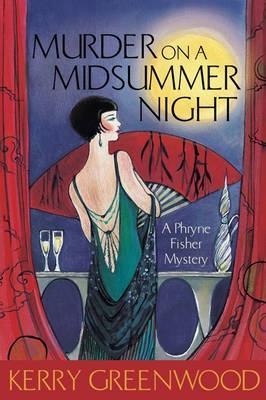
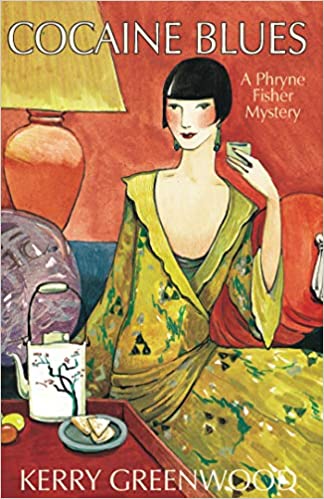
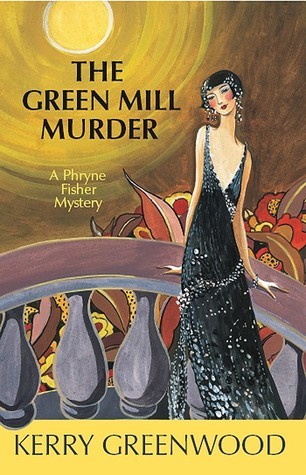
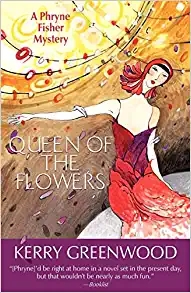
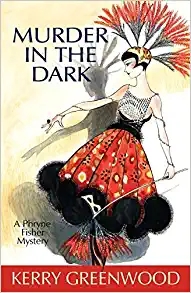


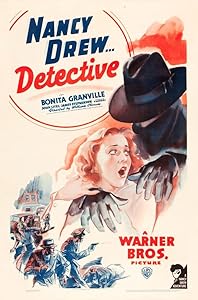

Leave a comment